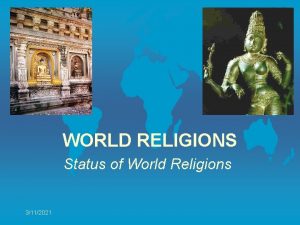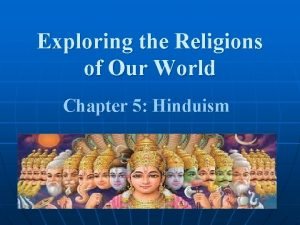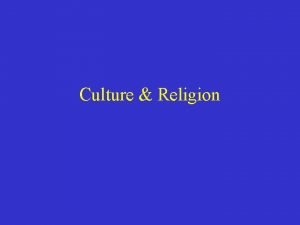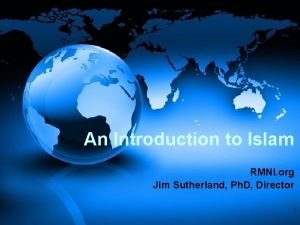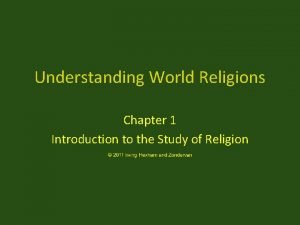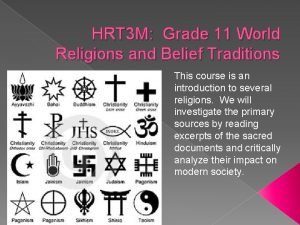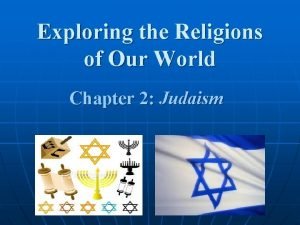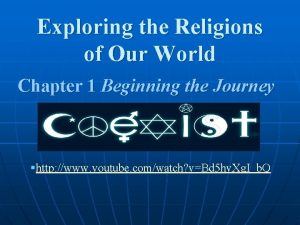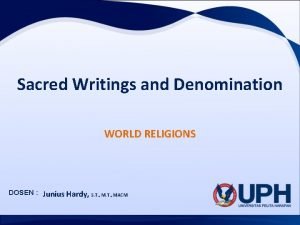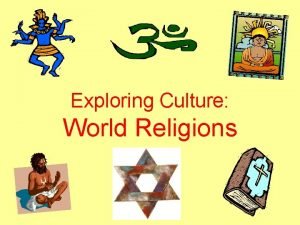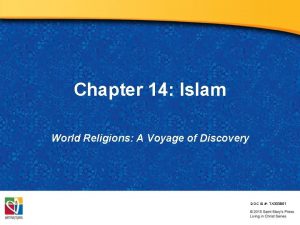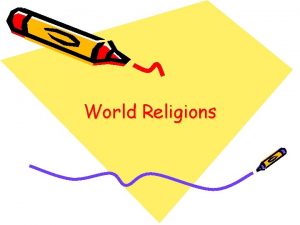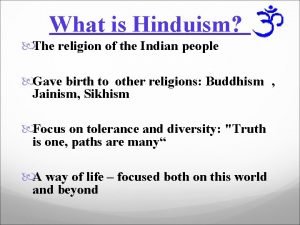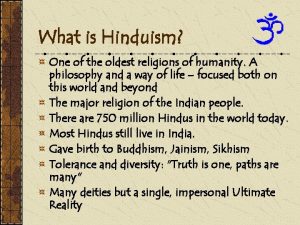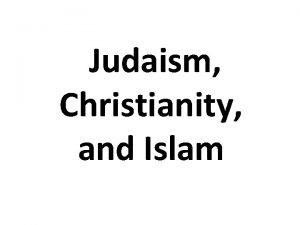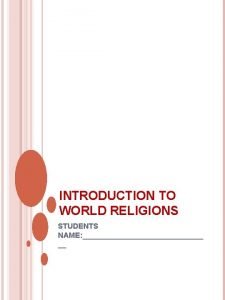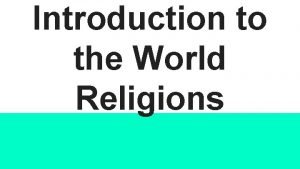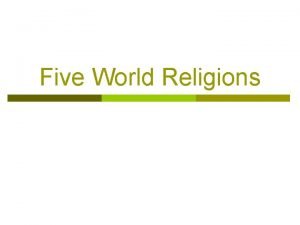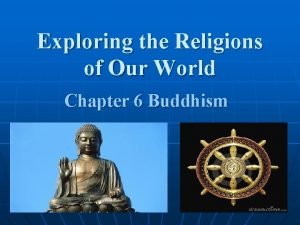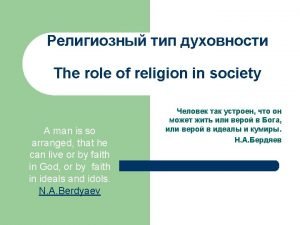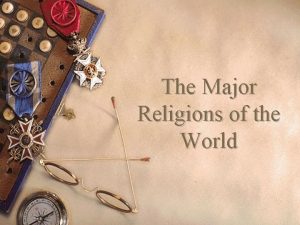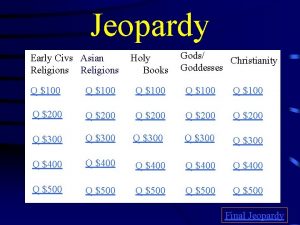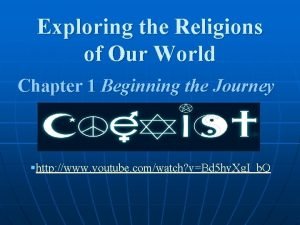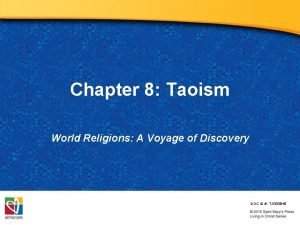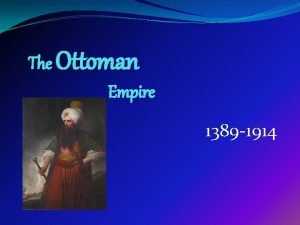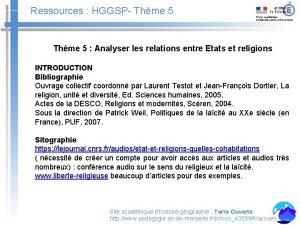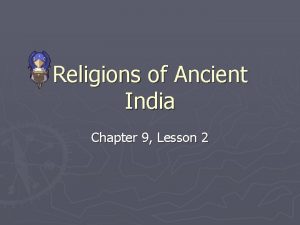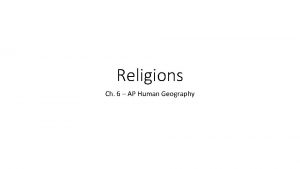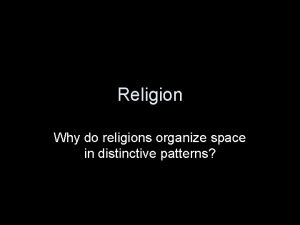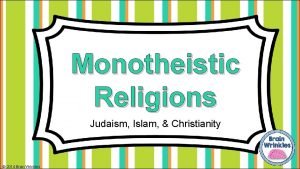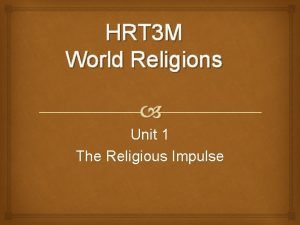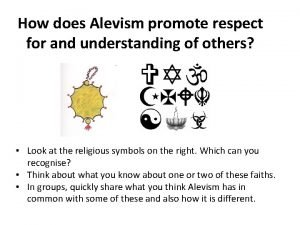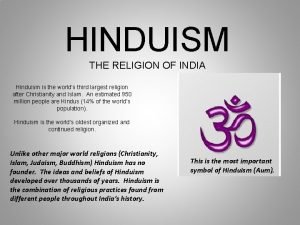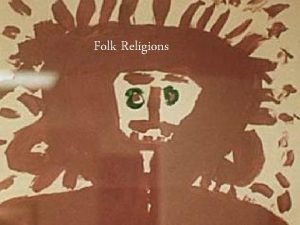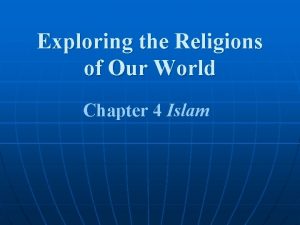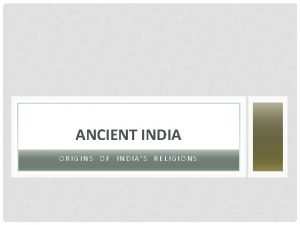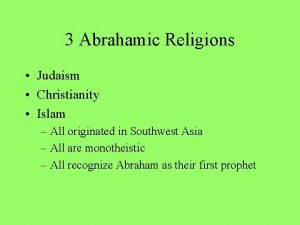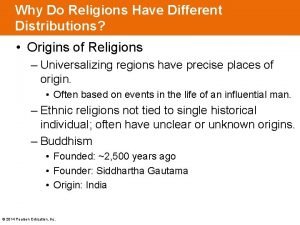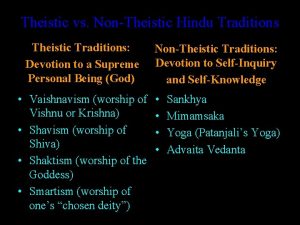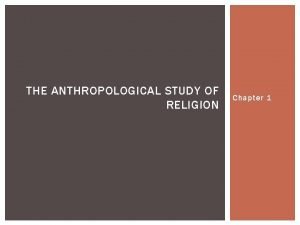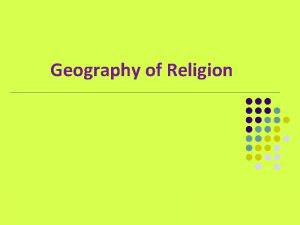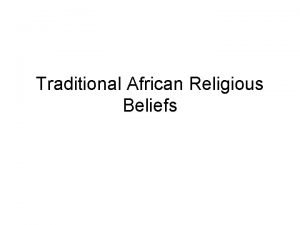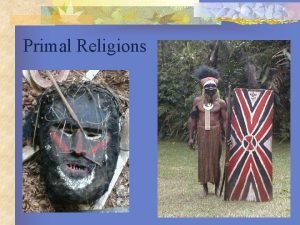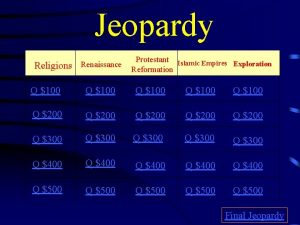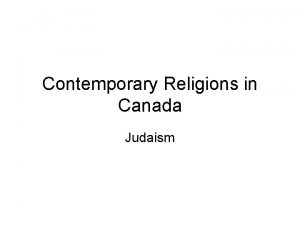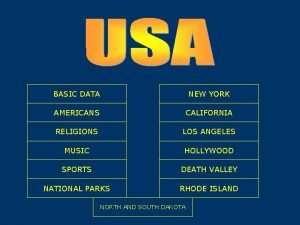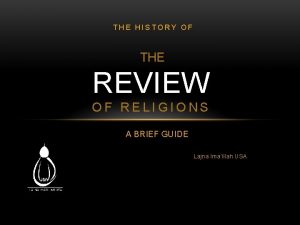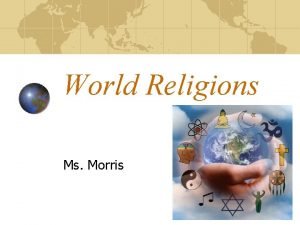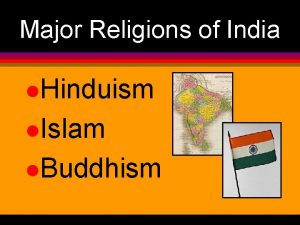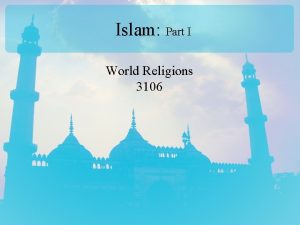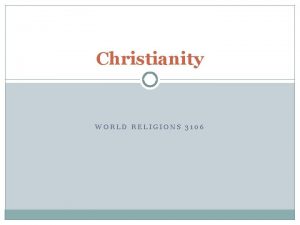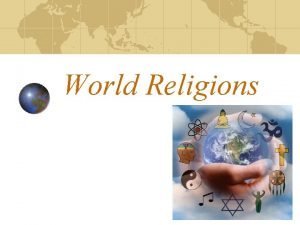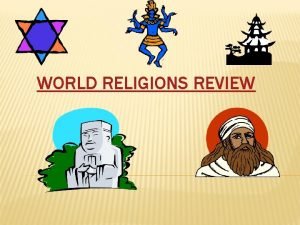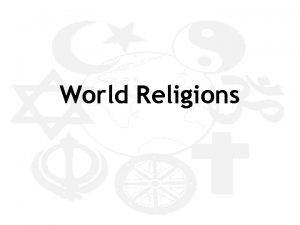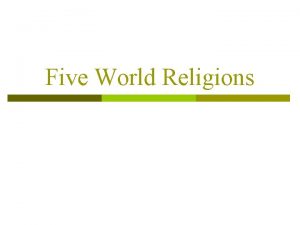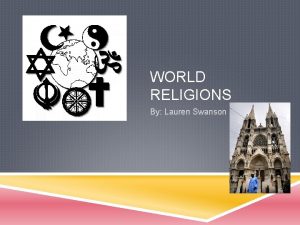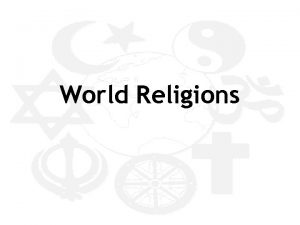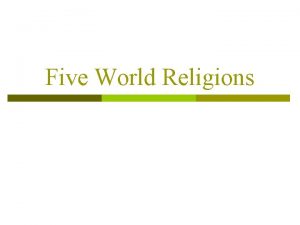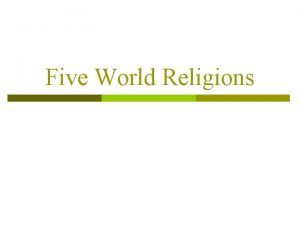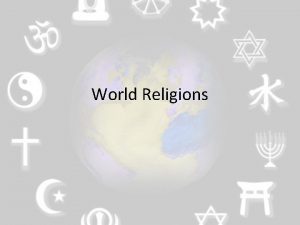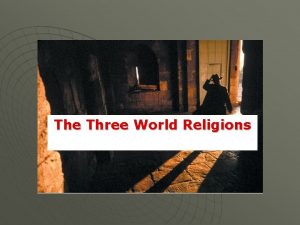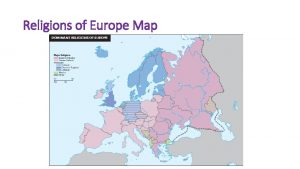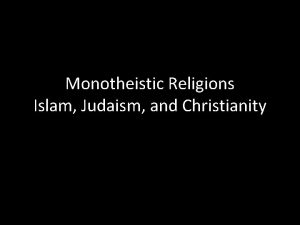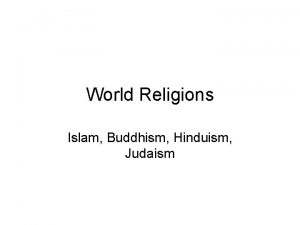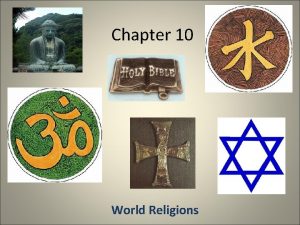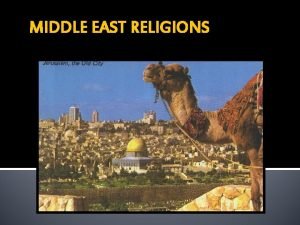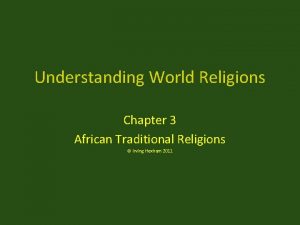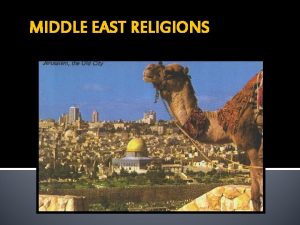Islam World Religions 3106 What is Islam Islam
































































- Slides: 64

Islam World Religions 3106

What is Islam? § Islam = Arabic word meaning “Submission to God. ” § Muslim = follower of Islam, “One who submits to God. ” § The Shahada = creed of Islamic belief “There is no God but God, and Muhammad is his prophet. ” § Numbers: Textbook says 1. 2 billion. Wikipedia says 1. 3 – 1. 6 billion § Canada: 1 million (out of 33 million)

Islamic Countries

Where did Islam Originate? Islam, one of the fastest growing religions in the world, began in Arabia may refer to: • Arab world of 23 Arabic-speaking countries • Arabian Peninsula, a geographic area in Asia • Saudi Arabia, the largest country in the Arabian Peninsula

origins Many ideals and customs of Arabian society at the time of Muhammad were transformed by the birth and development of Islam. Religious System • Prior to Islam, Arabian people were polytheistic • Practiced idolatry, worship of different objects (usually pictures or sculptures) that represent spiritual qualities • By the time Muhammad was born in 570 CE, Muslims believed the Ka’bah, a cube shaped building that Abraham built in Mecca (city in Saudi Arabia) to honour God, was filled with idols. • Believed the idols granted them favours and protected them

The Ka’bah in Mecca

Saudi Arabia Mecca was a trade city on the Red Sea

origins Social System • Arabia was divided into groups of people called tribes • Tribes sprung from the nomadic nature of living in the desert, tribes were like alliances between clans of different people/families • Tribal life led to the establishment of a tradition of rivalry and bloodshed that characterized Arabia before Islam • Women during this time were seen as the bottom of the totem pole, proven by the fact that female infanticide was widely practiced

origins Economic System • Merchants earned their livelihood through trade with merchants beyond Arabia • Merchant caravans were always in danger of being attacked by tribal Arabs • Armed conflicts occurred regularly as a way to solve family vendettas, or to avenge murders – considered an integral part of tribal honour and private justice • Also, the rich loaned money and other essentials to the poor, but put a lot of interest on the items so it was virtually impossible for the poor to pay back their loans – economic tyranny

MUHAMMAD Muhammad’s Life and Story: Read p. 320 -322

Muhammad § Born into the Quraysh tribe (big shots) § Orphaned at age 6, raised by relatives § Trained as a traveling merchant in caravans § Always preferred Monotheism to the Polytheism and Idol worship around him. § Age 20, met and married wealthy 35 year old widow Khadija.

revelation § In 610, during Ramadan, on retreat at age 40 on Mount Hira, Muhammad received a revelation. § The angel Gabriel appeared to him and commanded him to recite. § For the rest of his life he received revelations. § These were passed on orally to his followers § After his death they were written down in the Qur’an (Koran)

Prophet § He spoke out against Idols. § He said there was only one God. § This angered the people who controlled the Ka’bah, which was an important pilgrimage site for the Arab tribes. § In 619, his wife died. § Her tribal influence no longer protected him.

Night Journey and Ascension § Muhammad was taken by Gabriel to Jerusalem on a winged horse. § Once at the site where Abraham bound his son (Muslims believe it was Ishmael, the ancestor of all Arabs), they ascended through the heavens. § They met Adam in level I § They met John (the Baptist) and Jesus in level II § Then Joseph, Enoch, Aaron, Moses, and Abraham. § Muhammad was told how to pray.


The Hijrah: Flight to Medina • The birth of an organized government and political system based on the religion of Islam occurred when God instructed Muhammad to move to Medina (then called Yathrib) in 622 CE. • Hijrah = migration, the Muslim calendar starts from this event • Muhammad’s impact here was so compelling that some people refer to this city as Madinah al-Nabi, which means “City of the Prophet” • Muhammad was able to build a large community of Muslims in the city (almost everybody)

The Hijrah: Flight to Medina § Since Muhammad had essentially persuaded the people to give up their ancestral worship of idols, the Meccans were angry, thinking he was trying to destroy their way of life and tried to kill him. § Three battles are significant regarding the unification of Arabia under Muhammad and Islam: § Badr: Muhammad’s army of 313 defeats Mecca’s army of 1000 § Uhud: The Meccans return with an army of 3000, and apparently win, yet they do not push into Medina or conquer it § Battle of the Trench: The Meccans return with 10, 000 men. Muhamma orders his men to build a trench around the city which coupled with the desert heat, thwarts the rival army

The Hijrah: Flight to Medina § Muhammad’s victories ensured that not only the people of Medina were considering Islam, but so too were the people of Mecca § Muslim conversions grew steadily § Muhammad eventually led a group of 10, 000 into Mecca “Conquest of Mecca” § Few opposed him, or his removal of the idols from the Ka’bah § When Muhammad proclaimed to a gathered crowd, he said “May God pardon you. Go in peace. There shall be no responsibility on you today; you are free!” effectively changing the Meccans from a conquered people to a liberated people

Dome of the Rock/ Al Aqsa Mosque Built on the site of the Ascension in 689 -691

Dome of the Rock/ Al Aqsa Mosque Interior of The Dome of the Rock

Dome of the Rock/ Al Aqsa Mosque Dome of the Rock

Task: Complete “origins” work/note sheet

Muhammad’s farewell sermon § 632 CE § Muhammad visits Mecca with 140, 000 Muslims to perform his last pilgrimage § On his way from Medina to Mecca, he stopped at Mount Arafat where he delivered his “Farewell Sermon” § In one sweeping sermon, Muhammad offered forgiveness to those who had done wrong in the past while summarizing the main points of the Islamic religion § Died soon after at age 63

Muhammad’s farewell sermon: summary § Belief in One God without images or icons § Equality of all believers regardless of class or race § Individuals are only superior based on their piety § Better treatment of women § Obligatory distribution of wealth and land of a deceased person to his family/near relatives § The Qur’an and the conduct of the Prophet were to serve as the bases of law and healthy criteria for human life

Beliefs: general § For Muslims, beliefs are purely personal § It is regarded as charitable to guide others towards the Truth and to dispel ignorance, but Muslims are not called upon to compel anybody else to believe what they believe § To align oneself with God is part of one’s inner struggle § Muslims owe their religious faith to Muhammad, the Messenger of God

Beliefs: general Central Creed of Islam: “There is no god but God and Muhammad is the Messenger of God. ” The Prophet Muhammad on faith: “Thou shalt believe in the One God, in His angelic messengers, in His revealed books, in His human messengers, in the Last Day (or Resurrection and final judgement) and in the determination of Good and evil by God. ”

Beliefs: God § Muslims believe God’s proper name is Allah § Belief in an omnipotent, omniscient, and omnipresent God is central to the Muslim faith § Not only creator, but master of all § People are limited in what they can know, God will lead them to knowledge and fulfillment § Nothing moves without God’s knowledge or permission REMEMBER… Islam means submission to God; so, Islam is not only a belief in One God but a way of life. They believe that to think that you do not need God to lead you to knowledge and fulfillment is a “wrong move” and that surrender to God is the only way.

Beliefs: day of judgment § Muslims believe that every living person has a soul that lives on earth for one lifetime, and once it dies, it moves on to an after life § Motto: “Well-being in this world and well-being in the Hereafter. ” § When a soul passes into the after life, God reconfigures the person’s physical body so he or she can stand before Him on the Day of Judgement, the day that the soul is sent to Paradise or Hell § God will judge people’s actions by their intentions and motives

Beliefs: day of judgment PARADISE: HELL: • Eternal abode of beauty and • Abode of great torment and majesty anguish • Reward for a righteous life as a • Sent here for leading an evil believer in God life and for working against God • Avoided by sincere submission to God

Beliefs: distinctive features 1) Equilibrium between temporal and spiritual (body and soul) • Permits a full enjoyment of all the good God has created • Duties towards God such as worship, fasting, charity, etc. 2) “Universality of the call” • All believers are brothers and equals without distinction of class, race or language

Five Pillars of Faith 1. Declaration of Faith: The Shahada

Five Pillars of Faith 2. Prayer: The Salat § 5 times a day facing Mecca

Five Pillars of Faith 3. Almsgiving: The Zakat § 2. 5% of salary to charity

Five Pillars of Faith 4. Fasting: The Sawm § During the lunar month of Ramadan (July 20 – Aug 18 this year) § No food, drink, sex, during daylight hours

Five Pillars of Faith 5. Pilgrimage to Mecca: The Hajj § If possible, visit at least once

The Mosque § § Place of worship No chairs, no shoes Friday afternoon is prayer time at Mosque A Muezzin calls worshippers to prayer from a Minaret (slender tower) (0: 40)

The Mosque

The Mosque § Small niche on one wall called a Mihrab. It points to Mecca. § An Imam leads the prayers. § Running water is needed for ritual purification, the Wudu. § Used for prayers, Ramadan events and charity (giving and receiving)

Muslim Symbols § There are no symbols involved in worship. § No pictures, no sculptures. § Stylized verses from the Qur’an decorate the interiors, Arabic calligraphy.

Edirne, Turkey • There are no symbols involved in worship. • No pictures, no sculptures. • Stylized verses from the Qur’an.

Star and Crescent § On flags of Turkey (and Pakistan) § Crescent moon was originally a Greek symbol of Diana in Byzantium (later Constantinople, now Istanbul). § Star was added by Constantine in 330 AD to honour Virgin Mary.

Saudi Flag § Has the Shahadah (declaration of faith) on a Green background (Muhammad’s favourite colour). § And a curved sword.

The Qur’AN § Muslims believe it was dictated to Muhammad by God. § Criticism of Qur’an is considered Blasphemous. § Like the Torah, it can’t be altered. § Only the Arabic Qur’an is considered perfect. § Organized by Surahs (chapters), from longest to shortest.


The Hadith § Reports of the deeds and sayings attributed to Muhammad § Stories of Muhammad passed on orally and written down well after the death of the Prophet Muhammad § Clarifies religious practices such as prayers and almsgiving.

Groups and institutions • Within Islam, there are certain external duties one must perform such as prayer (salat), fasting, charity, etc. These external aspects belong to the domain of Muslim law which contains rules and regulations to govern one’s entire life. • There also internal duties such as faith, gratitude to God, sincerity. • This internal aspect is known as Sufism, which derives its teachings from the Qur’an and the Hadith • Islam has two sects, the Sunnis and the Shi’ahs – Sufism belongs to and his practiced by both sects. It is important to know that sufis are not considered to be a separate sect. • Both the Sunni and the Shi’ah sects, as well as the Sufis, believe in one God and that Muhammad is the Prophet of God

Groups Read p. 346 Sunni Shi’ah § 85% of all Muslims § 15% of Muslims § Iran and much of Iraq § Sufi (not considered a separate sect) § Mystical § Practice Asceticism and meditating on God. § Whirling Dervishes in Turkey

Women in Islam Read p. 535 -354 § Standards vary from country to country § Saudi Arabia very repressed § Women in Saudi Arabia (4: 00)

Islamic Calendar § Calendar is lunar § Consists of 12 months of 29 or 30 days each, totalling 354 days § Has no corrective system to align it with the solar calendar so the Islamic holidays to not always fall in the same season, and they occur earlier every year on the solar calendar § Years are numbered from the event of the Hijira (Muhammad’s departure from Mecca to Medina) in 622 CE, and designated AH (after the Hijira) § First day of the Islamic era is Muharram 1, 1 AH or July 16, 622 CE

Islamic Calendar The 12 Months of the Islamic Calendar 1. 2. 3. 4. Muharram – “forbidden” Safar – “void” Rabi I – “the first spring” Rabi II – “the second spring” 5. Jumada I – “the first month of parched land” 6. Jumada II – “the second month of parched land” 7. Rajab – “respect” 8. Sha’ban – “scattered” 9. Ramadan – “scorched” 10. Shawwal – “raised” 11. Dhu al-Qa’da – “the one of truce” 12. Dhu al-Hijja – “the one of pilgrimage”


Islamic holidays Ramadan § Not a holy day but a holy month, the ninth month of the Muslim year § Similar to the Jewish Yom Kippur in that both constitute a period of atonement § Those who are able must abstain from evil thoughts and deeds, food and drink (including water), and sexual intercourse from dawn until dusk for the entire month § In the summer season, the days of fasting are longer and it is a greater hardship to do without water § Non-Muslims in Muslim countries must be careful not to eat, drink, or smoke in the presence of Muslims during the daytime hours of fasting, as the law requires adherence to the fast in public § Traditional greeting during Ramadan is “May God give you a blessed month” and the reply is “May God give you a generous month”

RAMADAN

Islamic holidays Eid al-Fitr § Arabic for “Festival of the Breaking of the Fast” § One of Islam’s two major festivals; marks the end of Ramadan, the holy month of fasting § Receptions and private visits; when friends greet one another, presents are given, new clothes are worn, and the graves of relatives are visited § Traditional greeting “May God make it a blessed feast”

EID AL-FITR

Islamic holidays Al-Hijara § Islamic New Year § Celebrated on the first day of Muharram, the month in which Muhammad emigrated from Mecca to Medina in 622 CE (the Hijira) § There are few rituals associated with Islamic New Year; no prescribed religious observances § Day is regarded as a time for reflection on the Hijira and on the year to come § In modern times, some Muslims exchange greeting cards to celebrate the holiday

AL-HIJARA

Islamic holidays Dates for Al-Hijra, 2013 -2015 2013 – November 4 2014 – October 24 2015 – October 15

Islamic Milestones Birth § Believe a child is born free of sin § Ceremony after a child is born takes place § Father whispers the Call of Prayer in the babies right ear and the Command to Rise and Worship in the left ear § 7 days after the birth a name-giving ceremony takes place (Aqiqah) § Muslims can chose between a family name, one of Muhammad’s names, or one of the “Ninety-Nine Beautiful Names” that describe God. If one of the names of God is used, it must be proceeded by Abd (servant); such as Abdullah

Islamic Milestones Marriage § A legally sanctioned union between a man and a woman, designed to bring happiness and companionship to both § Once a suitable match is found, a contract is prepared which contains the various wishes of the bride and groom § The signing of the contract is the actual marriage itself, as long as it is witnessed by two Muslims. There is no need for a full formal ceremony, but many Muslims choose to have one for the celebration § Islamic tradition is the practise of polygamy p. 341 § The reasoning is to provide women with the opportunity to marry where there are more women than men § A Muslim man can marry up to four women § Divorce is permitted but considered a last resort


Islamic Milestones Death § Seen as a sense of hope as opposed to fear § They hope they will reach Paradise § Muslims believe that the burial should take place preferably on the day that the person has died § After the burial, a short period of mourning is observed § Usually three days § Muslims believe the deceased is visited by two angels who question the person about their life, faith, and deeds (both good and bad) while on earth

Expansion of Islam § Within 100 years of Muhammad’s death, Muslims controlled from India to Spain. § During Europe’s “Dark Ages” Islam had its “Golden Age. ” (lasted for 400 years) § After WWI, European countries dominated them when colonization became stronger § Discovery of oil in 20 th century led to a resurgance of Muslim power as the Islamic countries could use their trading power to control their destiny became an economic power

Muslims in Canada § Islamic presence in Canada has grown significantly since Muslim immigration in the mid 19 th century began § Muslims were originally attracted to Canada by new enterprises like the gold rush, farming and the building of the cross country railway § Big wave of immigrants after WWII with Canada becoming a peace oriented nation § Islamic studies introduced at Mc. Gill University in 1952 and University of Toronto in 1962 § 1, 053, 945 Muslims in Canada (2011), second largest religious presence after Christianity
 India religion map 2021
India religion map 2021 Exploring the religions of our world pdf
Exploring the religions of our world pdf Religion and geography
Religion and geography World religions percentage
World religions percentage World religions chapter 1
World religions chapter 1 Grade 11 world religions
Grade 11 world religions Religion
Religion Exploring the religions of our world chapter 1 pdf
Exploring the religions of our world chapter 1 pdf Muhammad islam founder
Muhammad islam founder Junius hardy
Junius hardy Religion islam
Religion islam Religions of the world
Religions of the world Religions of the world
Religions of the world Who is hindu
Who is hindu Religion
Religion Steyning c of e primary school
Steyning c of e primary school Religion in the world
Religion in the world Judaism location
Judaism location ______________
______________ Worlds religions
Worlds religions Hinduism
Hinduism Exploring the religions of our world
Exploring the religions of our world Religions of the world
Religions of the world Religions of the world
Religions of the world Religions of the world
Religions of the world World religions jeopardy
World religions jeopardy Exploring the religions of our world
Exploring the religions of our world World religions a voyage of discovery
World religions a voyage of discovery Was the ottoman empire tolerant of other religions
Was the ottoman empire tolerant of other religions Hggsp analyser les relations entre états et religions
Hggsp analyser les relations entre états et religions Chapter 9 lesson 2 religions of ancient india
Chapter 9 lesson 2 religions of ancient india Ap human geo topics
Ap human geo topics Why do religions organize space in distinctive patterns
Why do religions organize space in distinctive patterns Religions that believe in reincarnation
Religions that believe in reincarnation Abrahamic religions
Abrahamic religions What do all religions have in common
What do all religions have in common Golden rule of all religions
Golden rule of all religions Is hinduism a religion
Is hinduism a religion Define folk religion
Define folk religion Exploring religions chapter 4 large
Exploring religions chapter 4 large World's largest ethnic religion
World's largest ethnic religion Indias religions
Indias religions Indias religions
Indias religions What is abrahamic religion
What is abrahamic religion Why do religions have distinctive distributions
Why do religions have distinctive distributions Theistic vs non theistic
Theistic vs non theistic Primal religions
Primal religions Religion
Religion The sacred book of islam
The sacred book of islam Monotheism chart judaism christianity islam
Monotheism chart judaism christianity islam Hearth of christianity
Hearth of christianity East african religion
East african religion Religions
Religions Primal religions
Primal religions Religions
Religions Which of the following religions does pi not practice
Which of the following religions does pi not practice Religions
Religions Religions
Religions Religions
Religions Religions
Religions Primal religions
Primal religions How are buddhism and hinduism different
How are buddhism and hinduism different Perimeter of india
Perimeter of india Polytheistic religions
Polytheistic religions Hinduisml
Hinduisml
